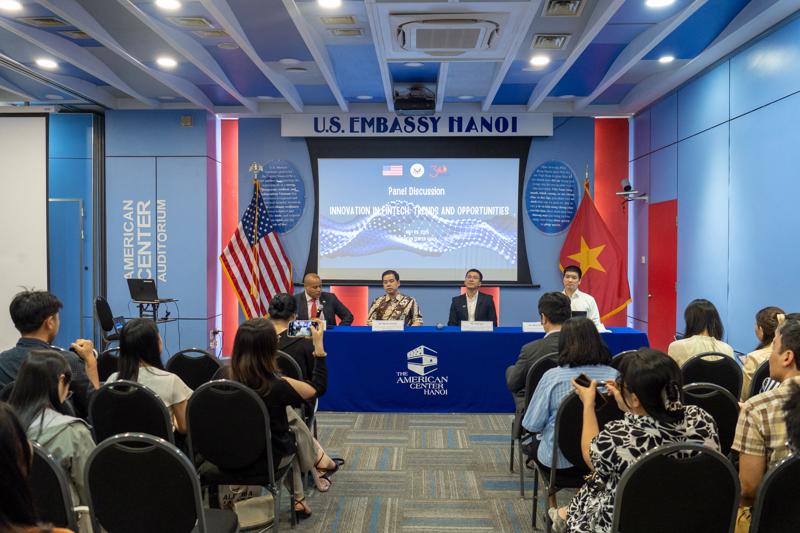Fintech has grown strongly over recent years and become an important part of the global financial industry. In Vietnam, with its rapid development, fintech has played an important role in promoting financial inclusion by providing financial services at low cost, offering many convenient experiences to users. However, the development of fintech in Vietnam still faces certain challenges.
Opportunity to break out
With the potential of a young, tech-savvy population, support from strategic international partners, the potential of an increasingly complete legal framework, and the strong acceptance of digital payment trends and advanced digital assets, Vietnam’s fintech sector has a huge opportunity to break through.
These were the important issues discussed during a workshop with theme “Innovation in FinTech - Trends and Opportunities”, organized by the U.S. Embassy in Hanoi on May 28.
Speaking at the event, Mr. Cameron Thomas Shah, Spokesperson from the U.S. Embassy in Hanoi, affirmed that fintech is a priority in U.S. economic policy. “The Vietnam - U.S. relationship is built on support for Vietnam’s prosperity, security, and peace,” he added. “This year marks the 30th anniversary of bilateral relations and economic cooperation, especially in the field of fintech, which is a testament to this strong development.”
In addition, he quoted U.S. President Donald Trump on the U.S. continuing to be a global leader in fintech, especially through improving the legal environment, cooperating with allies and partners to enhance financial services, especially cryptocurrencies and digital payments, not only for Americans but also for people around the world.
“Fintech is truly changing the way people and businesses manage and move money,” he noted. “Vietnam has a rapidly-growing fintech industry and ecosystem that drives innovation, digital transformation, and entrepreneurship.”
According to data from Visa, Vietnam’s payment ecosystem is vibrant, with the participation of more than 40 banks, payment networks, and the explosion of e-wallets such as MoMo, ZaloPay, and ShopeePay, as well as fintech companies focusing on customer loyalty solutions and digital banking. Fintech development brings many opportunities for businesses.
Ms. Dung Dang, Visa Country Manager for Vietnam and Laos, told Vietnam Economic Times / VnEconomy that Visa has a demonstrated history and track record when it comes to partnering with fintech providers of various size and verticals, from global to regional players, and it invests into programs and partnerships to capture opportunities and works with local fintech players in Vietnam to help scale their business and at the same time enrich the country’s digital payment ecosystem.
“Globally, we’ve seen success stories like Square in U.S., Revolut in UK, M-Pesa in Africa, and many other examples," Ms. Dung Dang said. "In Vietnam, our collaboration with fintech companies helps them develop localized solutions that meet the unique needs of the market.”
Furthermore, support and training programs for blockchain developers are gradually taking shape, along with the interest and pro-innovation policies from developed countries such as the U.S., opening up the potential for Vietnam to not only keep up but also to create breakthroughs, even surpassing existing models in the region.
Challenges exist
Experts also pointed out a number of challenges in developing fintech in Vietnam. In particular, the biggest barrier is the incomplete and unclear legal framework, causing difficulties for businesses in orientation and operation.
In addition, attracting and retaining high-tech talent, especially those with international experience, is also a difficult problem, requiring early training cooperation and building trust in the context of competition from global companies.
Ms. Dung Dang pointed out two challenges. First, collaboration across different sectors and agencies remains a challenge. To build a connected and inclusive digital economy, fintech companies, including Visa, need to foster partnerships that enhance service delivery. This involves leveraging data insights and analytics to drive outcomes and improve user experiences.
Second, ensuring seamless user experiences amid digital transformation efforts requires significant investment in user-centered design and innovation. As governments and businesses move towards centralized, digital services, fintech companies must focus on delivering intuitive and efficient customer interactions, using insights from extensive research and user testing.
However, experts also agreed on the potential for fintech development in Vietnam, as it possesses a market with a young, dynamic, and increasingly technology-savvy population. “These challenges, while formidable, also present opportunities for fintechs to innovate and collaborate, ultimately driving the digital transformation journey forward,” Ms. Dung Dang said.
Mr. Phan Duc Trung, Chairman of the Vietnam Blockchain Association and Chairman of iMatrix, hopes that new regulations in Vietnam, such as the draft Law on Digital Technology Industry, and sandbox mechanisms for digital assets will soon be passed, creating conditions for the market to develop strongly. At the same time, he also expects that Vietnam can build a strong blockchain network like the U.S. or China, but with a more open, unique approach.









 Google translate
Google translate